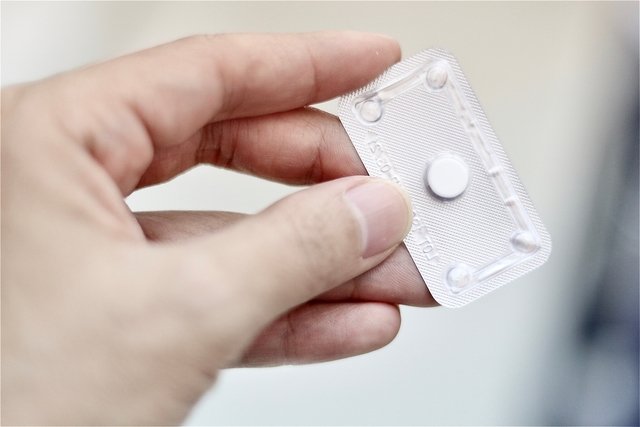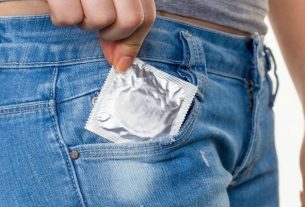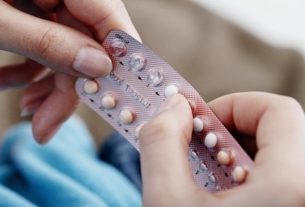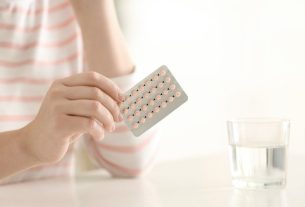The morning-after pill is an emergency contraceptive that can be used after unprotected sex or when the usual contraceptive method has failed, such as when a condom breaks or the contraceptive pill is forgotten.
The morning-after pill may consist of levonorgestrel or ulipristal acetate, which work by delaying or inhibiting ovulation. Pills containing levonorgestrel should be used up to 3 days after sexual intercourse, while pills containing ulipristal acetate can be used up to 5 days after unprotected sexual intercourse.
However, as the effectiveness of the pill decreases as the days pass, it is advised to take the morning-after pill as soon as possible. The morning-after pill can be purchased at pharmacies and does not require a prescription.

How it works
The morning-after pill works by inhibiting or postponing the occurrence of ovulation, reducing the chance of sperm fertilization and the occurrence of pregnancy, as long as it is taken in the first phase of the menstrual cycle.
Furthermore, the morning-after pill, when taken in the second phase of the menstrual cycle, which corresponds to the ovulatory phase, acts by altering the mobility of sperm and eggs in the fallopian tube, reducing the risk of fertilization and subsequent implantation in the uterus. This pill can also alter cervical mucus, which interferes with sperm migration to the tube, making contact between sperm and egg difficult.
Despite this, the morning-after pill has no effect after the fertilized egg has implanted in the uterus, which means that if it is taken too long after intercourse, it may not have the desired effect.
How to take the morning after pill
It is recommended that the morning-after pill be taken as soon as possible, preferably within 12 hours or up to a maximum of 72 hours after unprotected sexual intercourse. The morning-after pill can be taken on any day of the menstrual cycle, except when your period is already late, and can be taken with water or with food.
In cases of vomiting or diarrhea within 3 hours of taking the morning-after pill, it is important that another pill is taken immediately. If you are using contraceptive pills, there is no need to stop using them.
After using the morning-after pill, it is recommended to use a condom or diaphragm until the start of your next period.
When to take
The morning-after pill should be used in emergency cases, whenever there is a risk of an unwanted pregnancy, and is recommended in the following situations:
- Sexual intercourse without a condom or condom breakage. Check out other precautions you should take when having sex without a condom;
- Forgetting to take the regular contraceptive pill, especially if forgetting occurred more than once in the same pack. Also check the precautions after forgetting to take contraceptives;
- Expulsion of the IUD;
- Displacement or removal of the vaginal diaphragm prematurely;
- Cases of sexual violence.
In order for pregnancy to be avoided, the morning-after pill must be taken as soon as possible, after unprotected intimate contact or failure of the contraceptive method used regularly.
Possible side effects
After using the morning-after pill, the woman may experience headache, nausea and tiredness, in addition, after a few days she may also experience other symptoms such as:
- Breast pain;
- Dor abdominal;
- Diarrhea;
- Vomiting;
- Minor vaginal bleeding that is not related to menstruation;
- Delay in menstruation, which may occur 5 to 7 days after the expected date. If your next period is more than 5 days late, it is important to take a pregnancy test.
These symptoms are related to the side effects of the medication and it is normal for menstruation to be unregulated for some time. The ideal is to observe these changes and, if possible, write down the characteristics of menstruation in your diary or on your cell phone, so that you can show them to the gynecologist during an appointment. Learn more about the side effects of the morning-after pill.
When not indicated
The morning-after pill should not be used by women in the following situations:
- Suspected or confirmed pregnancy;
- Breast-feeding;
- Current or previous history of deep vein thrombosis or thromboembolism;
- Current or previous history of heart attack, angina or chest pain;
- Current or previous history of migraine;
- Brain stroke or narrowing of the vessels that support the heart;
- Disease of the heart valves or blood vessels;
- Diabetes associated with vascular disease;
- High pressure;
- Breast cancer or other confirmed or suspected estrogen-dependent cancer;
- Unidentified abnormal uterine bleeding;
- Tumor glandular benigno;
- Liver cancer, acute hepatitis or liver disorders.
The use of the morning-after pill should also be avoided by women who use antiretroviral medicines, such as efavirenz, nelfinavir or ritonavir, for example, or medicines, such as barbiturates, phenytoin, carbamazepine, rifampicin, rifabutin or griseofulvin, as they can reduce the effectiveness of the pill.
The morning-after pill should not be used by children, the elderly, men, or women who are allergic to any component of the pill. Discover other contraceptive methods to avoid pregnancy.
13 common questions about the morning-after pill
The most common questions about the morning-after pill are:
1. How do you know if the morning-after pill worked?
To know if the morning-after pill worked, your period must come on the expected date, with a delay of no more than 7 days. If this does not happen, it is recommended to carry out a pregnancy test, either pharmacy or blood, to rule out a possible pregnancy and confirm that the delay in menstruation is due to a side effect of the morning-after pill.
2. Can I get pregnant even if I take the morning-after pill?
Despite being indicated to prevent unwanted pregnancy, the morning-after pill is not 100% effective if taken more than 72 hours after sexual intercourse. But when it is taken on the same day, it is unlikely that the woman will become pregnant, however, there is a possibility.
The most sensible thing to do is wait a few days until your period arrives, and if it’s late, you can take a pregnancy test that you can buy at the pharmacy.
3. When does your period come after taking the pill?
One of the common side effects of the morning-after pill is delaying menstruation, which may start 5 to 7 days later than the expected date.
4. How effective is the morning-after pill?
According to a study carried out in 2011, a single dose of 1.5 milligrams of levonorgestrel, taken within 72 hours after unprotected sexual intercourse, prevents around 84% of pregnancies.
5. What happens if 2 or 3 morning-after pills are taken in 1 month?
If more than one morning-after pill is taken in a month, its contraceptive effect may be lost. Furthermore, it is important to highlight that this pill should only be used sporadically, or at most once a month, as it contains a very high dose of hormones, which can cause irregularities in the menstrual cycle and, therefore, is only indicated for situations emergency and not as a frequent contraceptive method.
If used more than twice a month, the morning-after pill may increase the risk of developing diseases such as thrombosis, pulmonary embolism, breast cancer and uterine cancer.
6. What are the side effects of the morning-after pill on menstruation?
One of the side effects of the morning-after pill is changes in menstruation. Thus, after taking the pill, menstruation may occur up to 10 days before or after the expected date, but in most cases, menstruation occurs on the expected date with a variation of about 3 days more or less. However, if the delay persists, you can take a pregnancy test.
7. Does the morning-after pill work during the fertile period?
The morning-after pill is effective every day of the month, however, this effect may be less during the fertile period, especially if ovulation has already occurred before taking the pill.
This happens because the morning-after pill works by inhibiting or delaying ovulation and, if it has already occurred, the pill will no longer have this effect. However, the morning-after pill also makes it difficult for eggs and sperm to pass through the uterine tubes and makes it difficult for sperm to penetrate the cervical mucus, and may, in some cases, prevent pregnancy through this mechanism.
The morning-after pill is only effective if ovulation did not occur during the first few days of the fertile period. If ovulation has already occurred and there is intimate contact, pregnancy is very likely to occur.
8. What happens if you have unprotected sex after using the morning-after pill?
If a person has taken the morning-after pill as an emergency contraceptive method and the next day they have unprotected sex again, there is a risk of becoming pregnant. This happens due to the fact that this pill does not work like a normal contraceptive method, what it does is inhibit or delay ovulation, which may have occurred after using the pill.
Ideally, a woman should talk to her gynecologist and start taking contraceptives. See the precautions you should take if you have intimate contact without a condom.
9. Are there any consequences of taking the morning-after pill during menstruation?
To date, there have been no recorded consequences of using the morning-after pill during menstruation.
10. Does the morning-after pill abort? How it works?
The morning-after pill does not abort because it can work in different ways, depending on the phase of the menstrual cycle in which it is used, and can:
- Inhibit or delay ovulationwhich prevents fertilization of the egg by sperm;
- Increase the viscosity of vaginal mucusmaking it difficult for sperm to reach the egg.
Therefore, if ovulation has already occurred or if the egg has already been fertilized, the pill does not prevent the development of pregnancy.
11. Does the morning-after pill cause infertility?
There is no scientific evidence that sporadic use of this pill can cause infertility, fetal malformation or ectopic pregnancy.
12. Does the morning-after pill change how the contraceptive works?
No, that’s why the contraceptive pill must continue to be taken regularly, at the usual time, until the end of the pack. After finishing the pack, you must wait for your period to start and, if your period does not occur, it is recommended to consult your gynecologist.
13. If the morning-after pill is taken during pregnancy, is there any risk to the fetus?
There are no records that the morning-after pill has teratogenic effects if taken during the first trimester of pregnancy, that is, that it affects the development and growth of the fetus.
The same thing happens if the morning-after pill fails and a pregnancy occurs, as it was taken long before the fetus began to develop, which is the phase in which it is most vulnerable.

Sign up for our newsletter and stay up to date with exclusive news
that can transform your routine!
Warning: Undefined array key "title" in /home/storelat/public_html/wp-content/plugins/link-whisper-premium/templates/frontend/related-posts.php on line 12
Warning: Undefined array key "title_tag" in /home/storelat/public_html/wp-content/plugins/link-whisper-premium/templates/frontend/related-posts.php on line 13



